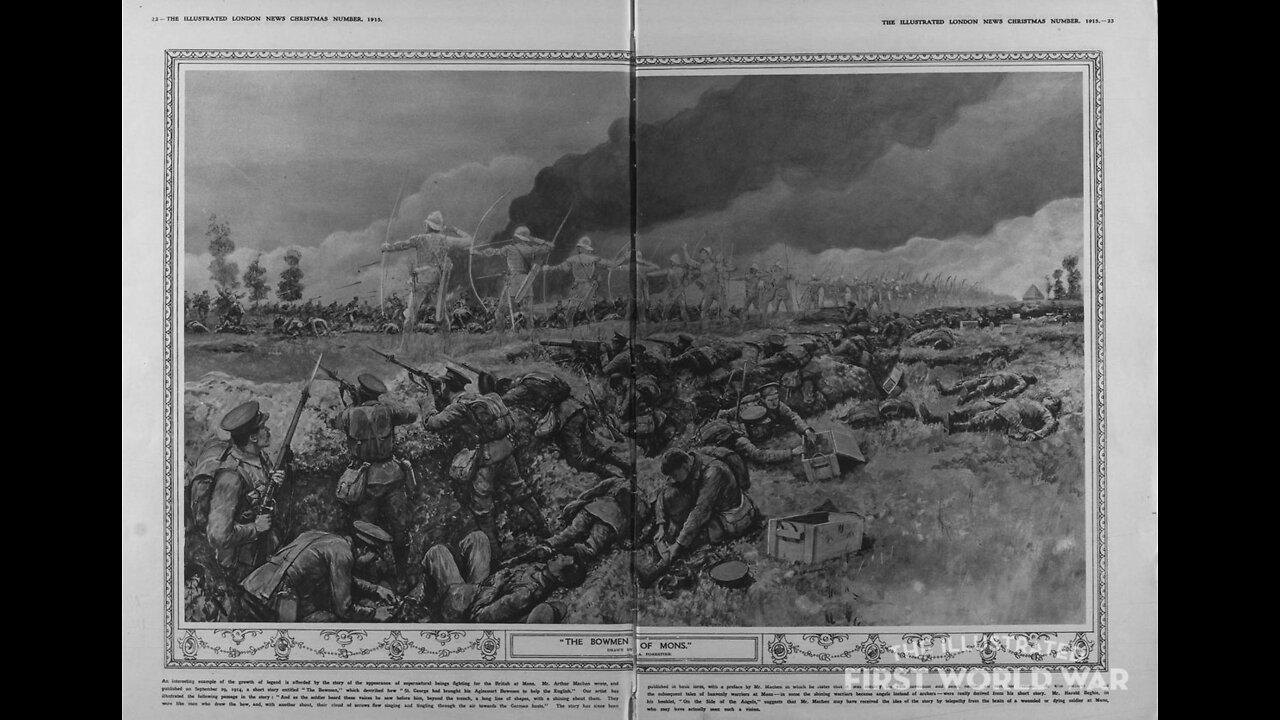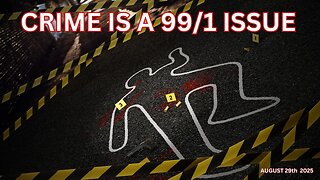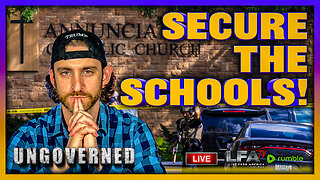Premium Only Content

"The Bowmen", by Arthur Machen
You can support me on Patreon! https://www.patreon.com/sststr
From the annotations:
First appeared in 1914 in the Evening News. Published in book form in the 1915 collection "The Angels of Mons".
the Retreat of the Eighty Thousand: British retreat from the Battle of Mons in 1914. Machen is surely also invoking the famous "Retreat of the Ten Thousand" Greek mercenaries from deep in Persian territory, as narrated by Xenophon in his Anabasis.
the Censorship: the Defense of the Realm Act of 1914 gave the British Government power 'to prevent the spread of reports likely to cause disaffection, or alarm'.
salient: here, "a spur-like area of land, esp. one held by a line of offence or defence, as in trench-warfare; specifically ... that at Ypres in western Belgium, the scene of severe fighting in the war of 1914-18".
Sedan: that is, a catastrophic defeat, as of the French by German forces in 1870, during the Franco-Prussian War
good-bye to Tipperary: from 1912 music-hall song "It's a long way to Tipperary", popular with British soldiers during the war. The original song concludes: "It's a long long way to Tipperary, but my heart's right there".
"What price Sidney Street?": the 1911 "Siege of Sidney Street", witnessed by Winston Churchill when he was Home Secretary (and also by Machen, in his capacity as a reporter), was a stand-off and shootout, between the Metropolitan Police and a pair of Latvian anarchists holed up in a house in Stepney, ending in their fiery deaths. The sense here, given the context, seems to be something like "Those anarchist chappies had nothing on us", on "That was a picnic compared to this".
"World without end. Amen.": The conclusion of the "Gloria Patri" doxology.
a queer vegetarian restaurant ... Adsit Anglis Sanctus Georgius: Machen may not have had a particular restaurant in mind, but historian of vegetarianism James Gregory says "there were turn of the century vegetarians who might have made connections with saintly interventions". In his introduction to "The Angles of Mons" Machen wrote: "It was at about this period that variants of my tale began to be told as authentic histories. At first, these tales betrayed their relation to their original. In several of them, the vegetarian restaurant appeared, and St. George was the chief character. In one case an officer - name and address missing - said that there was a portrait of St. George in a certain London restaurant, and that a figure, just like the portrait, appeared to him on the battlefield, and was invoked by him, with the happiest results."
Harow! Harow! - a call for aid, ultimately from Old French. Machen's bowmen sound like Anglo-Normans, though it is not likely that the Agincourt bowmen, most of whom came from Wales, would use the French expressions Machen evokes from them.
shooting at Bisley: site of the National Shooting Centre, approximately 30 miles from London.
the contemptible English: Kaiser Wilhelm II was supposed to have spoken dismissively of England's "contemptible little army".
Agincourt Bowmen: The Battle of Agincourt, immortalized by Shakespeare in Henry V, was fought on St. Crispin's Day (Oct 25), 1415. King Henry's longbowmen, who as noted were largely from Machen's own county of Gwent, played an important role in the English victory over a larger French force.
The picture used is "The Bowmen of Mons" from "The Illustrated London News" by A. Forestier, published Nov 29, 1915.
To follow along: https://web.archive.org/web/20120414102248/http://ebooks.adelaide.edu.au/m/machen/arthur/angels-of-mons/chapter1.html
-
 LIVE
LIVE
VINCE
1 hour agoGavin Newsom Is A Major Trump Fan | Episode 114 - 08/29/25
15,197 watching -
 LIVE
LIVE
Dear America
1 hour agoThe Left Chooses TRANS Over Christianity!! WOKE Mayor Is Doubling Down!!
18,975 watching -
 LIVE
LIVE
Nikko Ortiz
37 minutes agoLive - Reaction Time, News, Politics, and More!
242 watching -
 LIVE
LIVE
Matt Kohrs
8 hours agoMarket Open Chaos: PCE Inflation Report & Payday Friday || Live Trading
1,062 watching -
 17:35
17:35
itsSeanDaniel
40 minutes agoPro-Transgender Doctor HUMILIATED by Genius Conservative
1 -
 LIVE
LIVE
GritsGG
1 hour agoWin Streaking! Most Wins 3499+ 🧠
50 watching -
 LIVE
LIVE
Wendy Bell Radio
5 hours agoCrime is a 99/1 Issue
6,970 watching -
 LIVE
LIVE
Crypto Power Hour
2 hours ago $0.06 earnedBlockchain, The Fifth Evolution of Computing
110 watching -
 LIVE
LIVE
LFA TV
3 hours agoLFA TV ALL DAY STREAM - FRIDAY 8/29/25
4,250 watching -
 1:15:29
1:15:29
JULIE GREEN MINISTRIES
3 hours agoTHE GREAT WHITE WOLF NEXT TO YOUR PRESIDENT WILL SOON BE UNMASKED
59.4K152